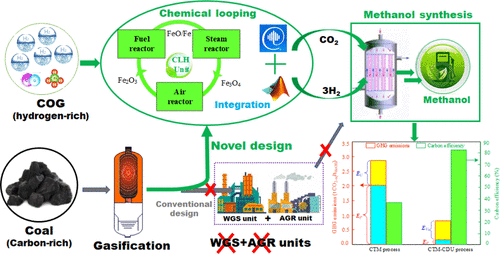当前位置:
X-MOL 学术
›
ACS Sustain. Chem. Eng.
›
论文详情
Our official English website, www.x-mol.net, welcomes your
feedback! (Note: you will need to create a separate account there.)
Opportunities for CO2 Utilization in Coal to Green Fuel Process: Optimal Design and Performance Evaluation
ACS Sustainable Chemistry & Engineering ( IF 7.1 ) Pub Date : 2019-09-19 , DOI: 10.1021/acssuschemeng.9b02979 Qingchun Yang 1 , Xufang Li 1 , Qing Yang 1 , Weiqing Huang 2 , Peijing Yu 3, 4 , Dawei Zhang 1
ACS Sustainable Chemistry & Engineering ( IF 7.1 ) Pub Date : 2019-09-19 , DOI: 10.1021/acssuschemeng.9b02979 Qingchun Yang 1 , Xufang Li 1 , Qing Yang 1 , Weiqing Huang 2 , Peijing Yu 3, 4 , Dawei Zhang 1
Affiliation

|
Methanol is predominantly produced by a coal-to-methanol process in China. However, this process is criticized by high CO2 emissions because of the high carbon contents of coal. The high CO2 emission and low resource utilization efficiency greatly weaken the competitiveness of the coal-to methanol industry. Coke oven gas, one of the hydrogen-rich resources, is used as fuel or directly discharged. This leads to a waste of valuable resources and serious economic losses. Aiming at effective utilization of CO2 and coke oven gas, this study proposes a novel coal-to-methanol process integrated with CO2 utilization for improving the system performance of the traditional coal-to methanol process. Coke oven gas is introduced to meet the H2/CO2 ratio required for methanol synthesis reaction by integrating with chemical looping technology. The key parameters are analyzed and optimized on the basis of the established model of the novel process. Furthermore, its advantages are manifested in detail in comparison with the conventional coal-to-methanol process. Results show that the novel process has a better comprehensive performance because it can increase the carbon and exergy efficiencies by 47.9 and 15.4% as well as save the investment and production costs by 23.3 and 7.5%. Moreover, the internal rate of return of the novel process is improved by 9.1% and the lifecycle greenhouse gas emissions are reduced from 2.86 to 0.78 t CO2-equiv per ton of methanol compared with the conventional process.
更新日期:2019-09-19






























 京公网安备 11010802027423号
京公网安备 11010802027423号